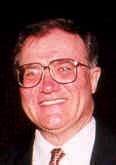Conference: "Standing Tall
Under Fire"
Speaker - Deacon William Toth
 Bill
Toth, Ph.D. is Professor of Moral Theology at Immaculate Conception Seminary,
Seton Hall University; Director of the Institute on Work at Seton Hall
University; Director of Leadership Development, Archdiocese of Newark, N.J.;
Chair of the Justice and Peace Commission, Archdiocese of Newark, and a member
of the Editorial Board of the Catholic Advocate, the newspaper of the Archdiocese
of Newark. Bill serves as a Deacon in St. Elizabeth's Parish, Wyckoff,
N.J. For over thirty years, Deacon Bill was CEO of a maintenance and
construction firm in NYC.
Bill
Toth, Ph.D. is Professor of Moral Theology at Immaculate Conception Seminary,
Seton Hall University; Director of the Institute on Work at Seton Hall
University; Director of Leadership Development, Archdiocese of Newark, N.J.;
Chair of the Justice and Peace Commission, Archdiocese of Newark, and a member
of the Editorial Board of the Catholic Advocate, the newspaper of the Archdiocese
of Newark. Bill serves as a Deacon in St. Elizabeth's Parish, Wyckoff,
N.J. For over thirty years, Deacon Bill was CEO of a maintenance and
construction firm in NYC.
Outline of Talk
- Introductory Comments
- What's the difference between a Mafia don and a theologian? The
don will make you an offer you can't refuse. The theologian will
make you an offer you can't understand.
- Real freedom is that which is given to us by God so that we can craft
ourselves.
- What good do we have that we have not received: Life, hope,
food, etc. The meek will inherit the earth.
- We rationalize our sins; for example, "Mistakes were made."
- The humble person sees gifts in those around him. God is a god
of fullness.
- Start of PowerPoint Presentation
- "The Lord is close to the brokenhearted, those crushed in spirit
he delivers" (Psalm 34:19).
- "Proud men, one and all, are abominable to the Lord"
(Proverbs 16:5).
- "Everyone who exalts himself, shall be humbled; and he that
humbles himself, shall be exalted" (Luke 14:11).
- "Blessed are the meek, for they shall inherit the earth"
(Matthew 5:4).
- "God resists the proud and gives grace to the humble" (James
4:6).
- In the Catholic moral and spiritual tradition, humility is contrasted
with pride. Humility is presented as the antithesis to every form
of pride. St. Gregory the Great called pride "The Queen of
All the Vices".
- Pride
- The arrogant person can think so highly of himself and can believe
himself entitled to:
- What his heart desires - even if it belongs to someone else
(theft, fornication, rape, adultery, etc.),
- Deference and is easily angered when he doesn't receive it
(anger).
- The arrogant person can be so self-satisfied that he refuses to
activate himself in pursuit of spiritual goals (sloth).
- The arrogant person can come to believe that his "eminence"
is an entitlement so much so that he will trample on the rights of
others (greed, lust).
-
- ================================================
Note by
Pat Lyons: I hope to get a copy of the PowerPoint file
and use it to create the rest of the Talk Outline.
The above was wordprocessed from the hardcopy.
================================================
- Q&A
(answers only)
- All of us, believers or not, have transcendental urgings.
Christianity offers one way to understand those urgings.
- We face horrific losses. When they happen, we reflect on
them. There are no easy answers. But there is death and
resurrection. The quintessential Christian virtue is hope.
- To a humble person, everything is a gift. He is amazed at it
all, is in awe.
- We confuse dominative power with true humble power.
- Humble people are down to earth. They don't yearn for things
they don't have. They are aware of God's presence in their lives.
- Kevin Dolan: In outplacement, men who lose prestigious jobs often
can't cope; they've lost the trappings of power. I try to bring
them to the realization that they are not their jobs, that they have
other talents and opportunities. Some can make the transition,
some can't. The ones who can't are unable to pull away from
society's definition of success.
Bill: The humble person anchors himself in his relationship to
God. It's the true source of his self-esteem.
(The notes of this outline were taken by David
G. Price. They were wordprocessed by Patrick Lyons.
These notes may not be reproduced without the written permission of the
presenter.
This page was last edited on December 30, 2001 by Patrick Lyons.)


 Bill
Toth, Ph.D. is Professor of Moral Theology at Immaculate Conception Seminary,
Seton Hall University; Director of the Institute on Work at Seton Hall
University; Director of Leadership Development, Archdiocese of Newark, N.J.;
Chair of the Justice and Peace Commission, Archdiocese of Newark, and a member
of the Editorial Board of the Catholic Advocate, the newspaper of the Archdiocese
of Newark. Bill serves as a Deacon in St. Elizabeth's Parish, Wyckoff,
N.J. For over thirty years, Deacon Bill was CEO of a maintenance and
construction firm in NYC.
Bill
Toth, Ph.D. is Professor of Moral Theology at Immaculate Conception Seminary,
Seton Hall University; Director of the Institute on Work at Seton Hall
University; Director of Leadership Development, Archdiocese of Newark, N.J.;
Chair of the Justice and Peace Commission, Archdiocese of Newark, and a member
of the Editorial Board of the Catholic Advocate, the newspaper of the Archdiocese
of Newark. Bill serves as a Deacon in St. Elizabeth's Parish, Wyckoff,
N.J. For over thirty years, Deacon Bill was CEO of a maintenance and
construction firm in NYC.